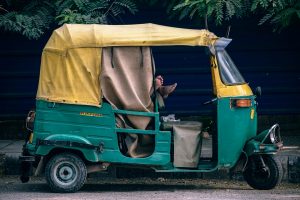Self- Identity

All the changes that I experienced in Germany were not external. Some uncomfortable and surprising changes occurred in me. One of them was a change in my self-identity.
Living in India, I had considered myself a world citizen. An Indian among Indians, I was one with the community. It was my belief, that the world was shrinking into a global village with the spread of the internet. I considered it a welcome change. It was, after all, the only way forward for humanity.
My move to Germany, I believed, would make my global outlook stronger. However, in a foreign state, I was constantly confronted with my Indian roots.
Every time I met a stranger, people wanted to know where I came from. It was a perfectly innocent and simple question.
Each time I replied with, “I am an Indian.”
Repeat something enough number of times, and you start to internalize the message. And you can no longer ignore it. Not that I didn’t know I am an Indian. But it had never been an important part of my identity. It was not necessary until now. I never was, nor am I an anti-national, but I was never a nationalist.
Our roots remain important, however far or, however long we stay away from our country.
I am not the first to experience this heightened sense of identity with my country of origin. My husband once commented that it was almost impossible for him to forget that he was a foreigner in India.
This self-identity can be a hindrance. However much you may want, it is not possible to blend into the new community.
One can aim to integrate, but it also has its consequences. There are many second-generation Turks in German. They were born and brought up in Germany and hold German citizenship. They complain that in Germany they are still seen as Turks. In Turkey, people consider them Germans.
Similarly, even if I take up German citizenship, I would still be a Indian-German. Second and third generation citizens are also stuck with this labelling.
Many Indians this year are also reflecting on their place in the country. And how they identify with their country, even if they have not left its shores. There has been a rise in fascism; and there has been a surge in anti-social activities by the Hindu right-wing party and its sibling organisations.
This Republic day was not one that Indians could ignore as usual.
Indians usually see The Republic Day and Independence Day as occasions to relax. There isn’t even the burden of celebrating any religious festival. This time, however, many are realising that the country they grew up in has changed. It has suddenly taken a turn they could not have thought possible. The whole country is polarised in a way that I have never seen before. Not just along religious lines, but also ideology among Hindus.
On a lighter note, back here in Germany, I am confronted with other things that are quintessentially Indian.
When I tell perfect strangers about my origin, some women seem pleased. They start gushing praises for the Bollywood movies with its romantic heroes. It is with difficulty that I manage not to roll my eyes in these situations. The women are, after all, trying to be nice and friendly. I have never associated myself with the craziness of Bollywood, even though have grown up on a diet of Hindi movies,
Nor was I prepared to encounter Bollywood movies here. Bollywood movies have quite a following here. They are screened occasionally on popular television channels, after being dubbed in German.
Wherever I may be, it seems there is no getting away from the good, bad, and the ugly of India.


